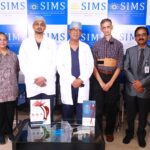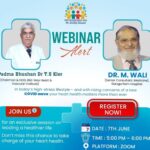New Delhi, September 28, 2021:
This World Heart Day, doctors at Fortis Healthcare called for maintaining a balanced lifestyle, and in light of the pandemic, they urged the public, particularly the youth, to take care of their heart health, get regular screenings and not ignore any significant symptoms. As the world struggles to fight COVID-19, cardiovascular disease (CVD) remains the world’s number one killer, and an estimated 17.9 million people died from CVDs in 2016, representing 31% of all global deaths. Of these deaths, 85% were due to heart attack and stroke. In 2016 India reported 63% of total deaths due to NCDs, of which 27% were attributed to CVDs. CVDs also account for 45% of deaths in the 40-69 year age group. For people living with heart disease, COVID-19 has presented multiple challenges. Many have been afraid to attend routine and doctor consultations, and have become isolated from friends and family. This year on World Heart Day, the emphasis is – USE HEART TO CONNECT – Harnessing the power of digital health to improve awareness, prevention and management of CVDs.
Dr Tapan Ghose, Director, Cardiology, Fortis Hospital Vasant Kunj said, “It is imperative to maintain a balanced lifestyle. Eat properly and ensure that the exercise you are doing is suitable for your body. The official guideline says that a person should exercise for 45 minutes a day five times a week. However, many youngsters tend to suffer from ‘exercise induced cardiomyopathy’, a condition in which there is cardiac muscle dysfunction which leads to heart failure. In addition to this, many consume processed protein or health supplements which are filled with steroids. These steroids cause the muscles to break and weaken the heart. Also, diet if not balanced can cause heart attacks. Too much protein causes a load on the kidneys, leading to high blood pressure which can lead to a heart attack. An excess of carbohydrates and fat lead to an excess of glucose metabolism, which causes the arteries to get blocked thereby leading to a heart attack. One should always remember that isotonic exercise like brisk walk , cycling, swimming and jogging are heart healthy. Isometric exercise like heavy weight lifting is not heart healthy.”
Dr Tapan Ghose, Director, Cardiology, Fortis Hospital Vasant Kunj adds, “On the flipside, young people are working long hours, are stressed out and tired, not sleeping well, not eating at the right time, filling themselves with caffeine and sugar to get through the day, relying on cigarettes to help manage their stress. Their day includes little or no exercise. They keep piling on the weight thinking that they will have enough time to address it later. They also do not go for regular screenings or annual checkups. As a result, they remain oblivious to what is going on inside their bodies. They also take their youth for advantage, thinking that nothing can happen to them as they are young. All this eventually leads to a delay in diagnosis which can often be fatal.”
Dr. Surendra Nath Khanna, Additional Director, Fortis Escorts Heart Institute, Okhla, New Delhi said,’’ Cardiovascular diseases (CVDs) are the leading cause of death globally, taking an estimated 17.9 million lives each year. We see patients starting from the mid-30s upto 80 years of age who require either medication or intervention for heart-related ailment. Looking fit or going to the gym does not establish the fact someone is healthy. There are multiple factors like lifestyle disorders, lack or more of physical activity, stressful life, lack of sleep, alcohol consumption, smoking, consuming excess supplements over-exercising may lead to heart attacks. Some ailments are also considered as major risk factors for heart attacks or cardiac arrests including diabetes, bad cholesterol, obesity, hypertension, etc. Any symptom like chest pain or chest discomfort, unexplained fatigue, racing or slow heartbeat, shortness of breath, lightheadedness, dizziness, fainting (syncope), or near fainting – should be taken seriously and medical attention is required without any delay.
healthysoch







